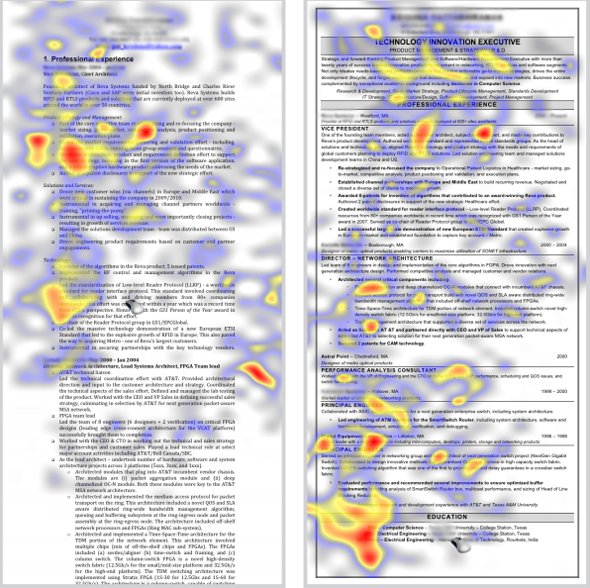5 Things Hiring Managers and Recruiters Want On Your Resume

9 min read

There is nothing easy about writing a resume. After all, if resume writing were easy, then we would all have the perfect resumes we need. The fact is that resume writing is a challenge for even the best writers. Still, there is one thing that you can do to simplify that writing process and enhance your odds of success: know your audience.
When you’re starting any application, there should be one key question in your mind, “What do hiring managers look for?” Luckily, we have some of the answers. In the following guide, we will be taking a look at 5 things hiring managers and recruiters want on your resume.
What is the most important thing employers look for on a resume?
So, what do hiring managers look for when reading applications? Let’s get this one out of the way right off the bat. When it comes to the most important thing that every employer wants to see on your resume, it’s simple: clarity.
You need to be able to sum up your experience and value-added proposition in a succinct way. Remember, hiring managers and recruiters often look at dozens of resumes every day. They rarely take the time to carefully evaluate a resume unless it quickly captures their attention.
The 5 things employers look at first on a resume
Work history and years of experience
Education and degrees
Alignment with the job description
Your motivations
Achievements from your work experience
Here is a heat map from a study done by the Ladders on what hiring managers look at while reviewing two resumes:

As you can see from the resume heat map above, the resume on the left had the most focus on the top third, containing the name and contact information, current title, and current work experience. The bottom of the resume on the left ends with a solid block of text that the recruiters did not spend much time on.
In contrast, the resume on the right has a more segmented layout and was easier to scan for key information, including name, contact information, and current title, as well as the professional summary, prior work experience, and education section.
Expert Tip
Professional resume writers know how to organize your resume to appeal to hiring managers. Check out our guide to the best resume writing services to find your perfect fit!
The only thing you can really control is making sure your achievements stand out and that the information is tailored to the position you're applying for.
You also need to highlight your achievements to ensure you stand out from the competition. Quantifiable achievements really capture the attention of a hiring manager.
Here is an example of a responsibility on a resume:
“Responsible for seeking out new marketing campaigns to increase revenue.”
It serves you better to word the text as an achievement. That would look like this:
"Increased revenue by 21% by implementing new paid marketing channels, including Google Adwords, Adroll, and Bing Ads."
See the difference? The second description shows an actual accomplishment with quantifiable achievements. This is much more effective than the first description.
You also need to develop a summary statement that can present your case in a compelling way.
We wrote a good post here on how to write a good resume summary.
If that is interesting enough, then the employer will invest the time needed to more carefully analyze the rest of your resume. Fail to capture their attention, however, and you can rest assured that your resume will be cast aside.
You also need to ensure your resume is optimized for applicant tracking systems which most employers use today.
What do hiring managers and recruiters look for on a resume?
Whenever employers pick up a resume, their eyes and mind are instantly searching for one thing: a reason to continue reading. In fact, they have a checklist of things they want to see at the ready. Some job seekers try to focus on creative language and clever content to spark interest, but that can be distracting.
Average hiring managers and recruiters won’t be swayed by fluff. Instead, they're looking for potential value for the company. So, if your summary manages to capture their interest, you still need the rest of the resume to convince them that you’re the right candidate.
To achieve that objective, you need to craft a narrative that properly explains the value that you can bring to the position. Why? Because it is all about value.
Your resume is basically a sales tool that you use to land an interview. It’s the initial introduction that gets your foot in the door so that you close that sale.
To satisfy hiring managers and recruiters, your resume should include the following details:
1. Alignment with the job posting
If you think that you can just send the same resume to multiple employers, think again. Hiring managers are always looking for candidates whose resume aligns with the job in question. Every good job posting will include details about the skills and experience that the company wants to see. Use the job description to identify the key skills that match your background.
You should tailor your resume to ensure that you are properly highlighting those skills and experiences. That will make it easier for the hiring manager to quickly see that you meet those basic qualifications.
Remember, hiring managers and recruiters need to make snap decisions. By including the right keywords and details about your professional experience, you can help them quickly identify you as a viable candidate for the job.
2. Your motivations
It is not enough to just show value in your resume. Hiring managers and recruiters will also want to see that you’re properly motivated.
When they read your resume, they should be left with the impression that you’re dedicated to your employer’s success. That means making the resume about something more than your needs.
The best way to show this motivation is to highlight your accomplishments and the reasons why you worked to succeed in previous jobs.
Another actionable tip is to include a professional summary instead of an objective statement. This focuses on your value rather than your goals.
3. Your quantified impact
When answering the question “What do hiring managers look for?” there’s one thing you shouldn’t overlook. Details matter when you’re talking about your achievements. Nobody wants to read about how you helped increase your company’s sales unless you can provide specific benefits. So, instead of just noting those increased sales, try using real numbers. Be specific about the results that you achieved.
Example of using metrics on a resume:
“Successfully created an innovative sales program that increased sales by 32% in the first half of 2015, improved customer acquisition by 12%, and enhanced client retention by 14%.”
Do you see how this information is likely to pique the hiring manager’s interest? Those real numbers demonstrate real results that will catch the reader’s attention.
4. The right keywords
Spoiler: For both hiring managers and recruiters, keywords can be essential for success. Now, employers won’t generally be conscious of those keywords in your resume, but that doesn’t make them any less important.
Keywords are vital when dealing with recruiters since most won’t be able to find you online without them. Their searches of sites like LinkedIn will never lead them to you if you fail to use the right keywords. If you're posting your resume online, recruiters might also be searching your uploads for certain keywords.
Hiring managers are a slightly different story, of course. With them, you need keywords just to get your resume to their desks. Without the right keywords, your resume won’t get past the Applicant Tracking Systems, which means human eyes may never get to see it.
You can find many of the relevant keywords in that job posting. But it doesn’t end there. You should also try to think like the hiring manager and imagine which keywords you would use if you had to fill that job. Incorporate those words into your next resume.
Job hunting is a sales process
Your job is to sell yourself to the employer. Keep in mind that recruiters spend just seven seconds looking at each resume. Put simply, you don’t have long to make a good first impression.
Recruiters have specific needs when they’re trying to locate the right candidates for their clients. To satisfy those needs, you need to focus on the one thing they look for more than any other: your roles and achievements in previous jobs.
When you’re tailoring your resume for a recruiter, you need to make sure that your previous roles, achievements, and actual responsibilities are clear. You also need to ensure that the job titles and duties align with the job you’re seeking.
Why? Because recruiters aren’t going to spend a lot of time trying to find a creative way to make your resume fit their needs.
Key takeaways
Want to get ahead? It’s important to learn what hiring managers and recruiters want to enhance your resume.
Resumes can be a challenge to create, but there are ways to ease that pressure. Getting into the mindset of the hiring manager is the way to go.
When you know what recruiters are looking for in a resume, you can create the tools you need to land those critical interviews.
Focus on these basic elements, and you’ll soon find that your resume is more effective than ever. Why not get started now?
Make sure your next application stands out from the crowd with our free resume review tool. If you’re looking for a way to wow hiring managers and recruiters, our report will give you all of the hints, tips, and advice you need.
Recommended reading:

Written by
Charlotte Grainger, Editor & Content Writer, Charlotte Grainger, Editor & Content Writer
Charlotte Grainger is a freelance writer living and working in Sheffield, UK. She has a passion for career development and loves sharing tips and advice. Follow her on Twitter
